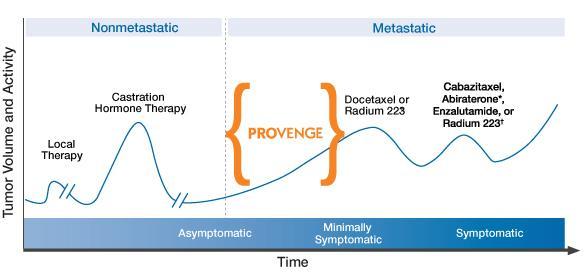Recurrence After Initial Treatment
A number of options are available for prostate cancer recurring after initial treatment (PSA rising). These treatments include surgery, radiation, cryotherapy and HIFU, and are depending on the initial treatment and other factors. The timing of the follow-up treatment is connected with the doubling velocity of the PSA, the PSA nadir (lowest PSA value after initial treatment) and the treatment option itself.
An overview of options after radio-recurrent prostate cancer is given here.
Imaging techniques such as the Axumin Pet/CT scan or the newly FDA approved GA PSMA-11 scan may be able to identify the recurrence location, assisting in establishing treatment plans. This Axumin scan is widely available with more than 10 locations just in the DFW Metroplex.
Recurrence After Secondary Treatment
A failed secondary treatment is usually followed by Androgen Deprivation Therapy (ADT). Most commonly LHRH agonists such as Lupron, Eligard and Firmagon (Degarelix) are used. Sometimes combinations of the medication (ADT2) with antiandrogens such as Casodex and (ADT3) 5-alpha-reductase inhibitors such as Proscar and Avodart are preferred. ADT may accelerate loss of bone density. Zometa and Prolia (Denosumab) are two drugs approved to assist in maintaining bone health; another Denosumab formulation, Xgeva, is used for patients with metastasized PCa.
webinar video: Overcoming the Effects of ADT
(Richard Wassersug, PHD)

Schematic Treatments for Prostate Cancer
YOUR Treatment may be different
Failure of Hormone Management
Hormone management will not result in the elimination of cancer. It will mainly reduce the production of new cancer cells. ADT is a temporary treatment delaying cancer growth. ADT may eventually fail and the cancer becomes hormone-refractory or castrate resistant. This is usually referred to as metastatic castrate resistant prostate cancer (mCRPC).
Though hormone management may have been administered through your urologist, treatments for hormone refractory patients are usually administered by an oncologist.
Treatments after failure of ADT include
– Radiation : This is different from radiation for primary or secondary treatment; the radiation is directed at metastasized cancer lesions
– Chemotherapy : The most common drug for chemotherapy is Taxotere® (docetaxel). Other drugs are available.
– Immunotherapy : Immunotherapy is a new treatment option available for hormone refractory prostate cancer patients. This therapy is available for patients with no pain from bone-metastases; see paragraph below.
– Second line treatments : Second line treatments usually administered after chemotherapy, include Zytiga™
(abiraterone), Xtandi (MDV3100) and Jevtana® (cabazitaxel).
– FDA just approved the new injectable radioactive agent Xofigo® (radium-223 chloride, Alpharadin®).
– Clinical Trials : There are a number of ongoing clinical trials focused on hormone management failure. Check
with your oncologist for trials available.
Resources
An excellent summary of dealing with advanced prostate cancer is found in the Advanced Prostate Cancer Resource Kit, provided by Us TOO International.
For the latest information on drug sequencing and novel approaches go to Optimizing Outcomes of Advanced Prostate Cancer …
Also read Gaining on Prostate Cancer
Immunotherapy
Immunotherapy is a new treatment option available for hormone refractory prostate cancer patients . Provenge® is a process designed to fully activate a man’s immune cells to better identify prostate cancer cells as abnormal cells in the body.
A Provenge provider list (enter your zipcode) is available.
Pat Fulgham, MD; Presentation: (October 2019)
Localized Treatment of Prostate Cancer and
Salvage Radical Prostatectomy
Guidelines for Advanced Prostate Cancer treatments
Treatment of Advanced Prostate Cancer
Risk of Recurrence after PCA Treatment
Symposium 2018 Presentation, Dr. Bagrodia

